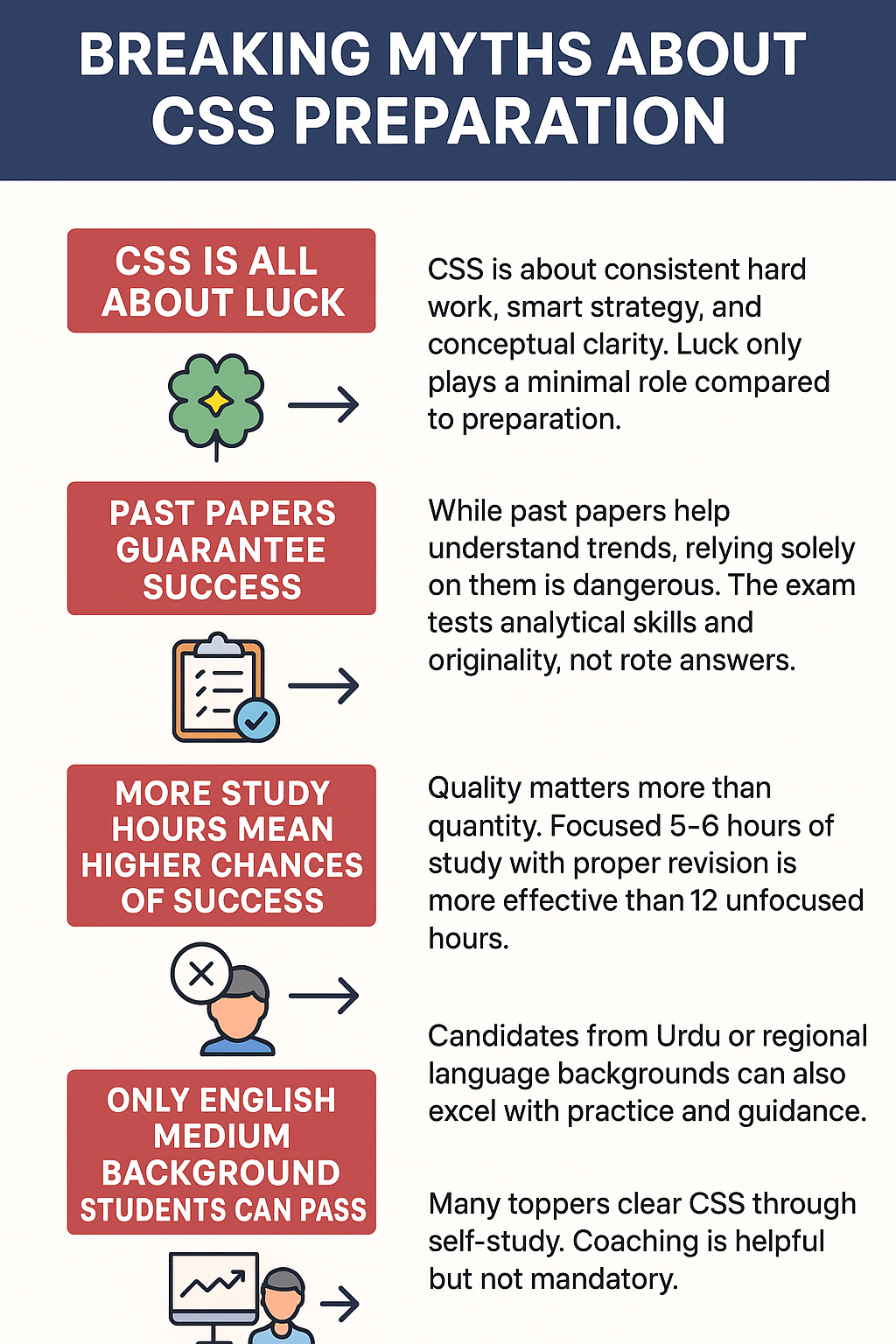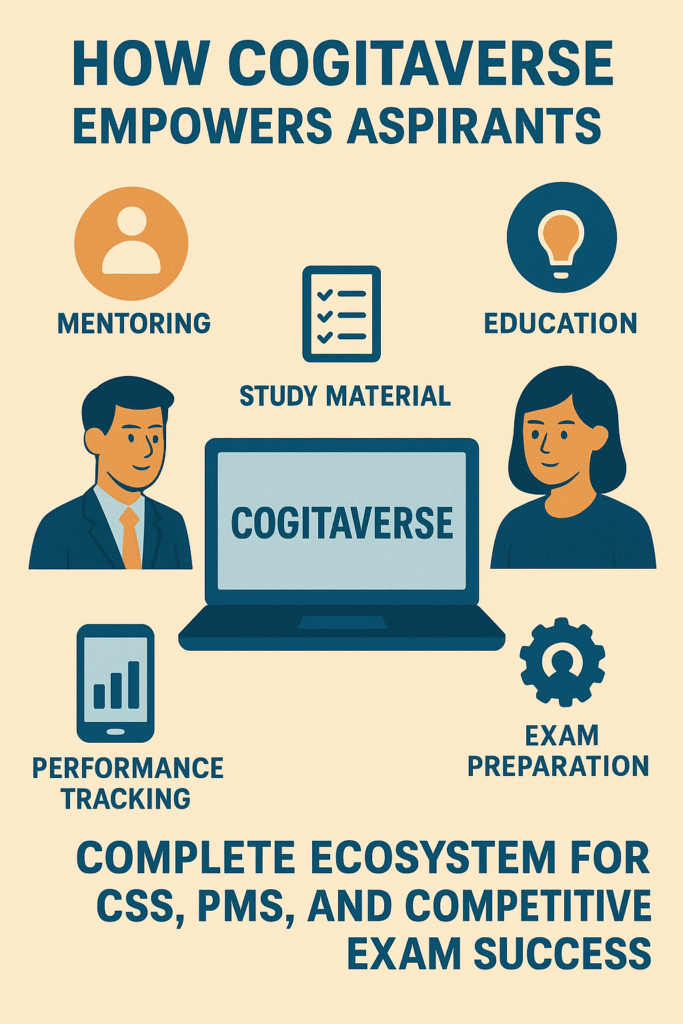Why Choose Civil Services in Pakistan? A Path to Impactful Leadership
A Calling, Not Just a Career
In a country as dynamic and diverse as Pakistan, choosing a career path that blends authority, service, and nation-building is rare. Civil Services—especially through CSS (Central Superior Services)—offer not only this blend but a chance to become part of Pakistan’s decision-making elite.
Every year, thousands of aspirants prepare for one of the most challenging exams in the country, not merely for power or perks, but for purpose. But why is this pursuit worth it? Let’s explore.
A Career That Grows With You
The CSS journey is not stagnant. Officers get routine promotions, specialized training at institutions like National School of Public Policy, and the chance to serve abroad as ambassadors or high commissioners.
From Assistant Commissioner → Deputy Secretary → Additional Secretary → Federal Secretary, this linear growth path provides clarity, dignity, and long-term vision.
Security, Perks, and Prestige—Built In
Beyond the rewarding nature of public service, a civil‑service career provides one of Pakistan’s most stable and comprehensive compensation packages. A BS‑17 officer begins with a basic monthly salary in the range of PKR 80,000–100,000, which grows through scheduled grade increments and cost‑of‑living allowances. Housing is often provided in government colonies, while medical coverage extends to officers and their immediate families under the Sehat Sahulat Program. Official vehicles, fuel allowances, and domestic staff allowances are standard perks; frequent international training and study tours broaden professional exposure. Retirement benefits include a generous pension scheme—often with post‑retirement appointment opportunities in advisory roles or provincial boards—and access to government guest houses nationwide. This blend of financial security, benefits for dependents, and post‑service career options makes CSP not only a prestigious vocation but also a sustainable, long‑term investment in your and your family’s future. While idealism drives many CSS aspirants, the practical benefits are hard to ignore:
- Official residence and transport
- Medical coverage
- International study tours
- Government guest house access
- Early pension and post-retirement advisory roles
These benefits make civil services one of the most secure careers in Pakistan—ideal for those seeking a balance of impact and stability.
Motivation for the Youth: A Legacy to Build
With over 64% of Pakistan’s population under the age of 30, the future of this nation truly rests in the hands of its youth. Civil services offer a structured path for young leaders to channel their energy into tangible progress—whether that means designing digital governance models for remote districts, leading disaster‑response teams when floods strike, or spearheading education reforms that lift entire communities out of poverty. A CSP officer’s early-career postings often place them in frontline roles—managing public health campaigns in rural Sindh, launching entrepreneurship initiatives for urban youth in Karachi, or coordinating climate‑resilience projects in Gilgit‑Baltistan—giving young officers responsibility and the authority to innovate. By choosing CSS, young aspirants gain access to professional networks, leadership training at institutions like the National School of Public Policy, and mentorship from senior officers, all of which accelerate personal growth and amplify the impact they can have on society.
“Do not wait for leaders; do it alone, person to person.”
— Mother Teresa
Civil Services give you the pen to write policy, the voice to demand change, and the power to implement it. For dreamers, doers, and patriots—this is your battleground.
Why Now? Why You?
Pakistan stands at a pivotal moment: rapid urbanization, digital transformation, and evolving regional dynamics demand agile, ethical leadership more than ever. As new trade corridors open and climate challenges intensify, policy innovation and ground‑level execution become critical. This urgency creates an unprecedented opportunity for fresh talent to step forward—if you launch your civil‑services journey today, you’ll be among the first to shape Pakistan’s response to 21st‑century challenges.
Moreover, today’s aspirants benefit from resources that didn’t exist a decade ago: online learning platforms, interactive study communities, data‑driven analytics of past exam trends, and mentorship networks spanning every province. If you combine this wealth of tools with the inherent energy, adaptability, and tech‑savvy mindset of your generation, you have the perfect formula for success. In short, there has never been a better time—and a more capable cohort—ready to seize the CSS path and steer Pakistan toward its full potential.
As Pakistan faces new geopolitical, climate, and economic challenges, the need for ethical, energetic, and educated leadership is greater than ever.
So, if you:
- Dream of improving lives
- Thrive on responsibility
- Believe in Pakistan’s potential
Then CSS isn’t just a job—it’s your destiny.
“CogitaVerse is here to guide you—step-by-step, exam-by-exam—to not just crack the test, but become a leader that Pakistan deserves.”
Choosing a career in civil services in Pakistan is more than just a job choice—it’s a commitment to shaping the nation’s future. The Civil Services of Pakistan (CSP) offer a unique opportunity to serve the public, influence policy, and drive meaningful change in a country of over 240 million people. From addressing socio-economic challenges to representing Pakistan on the global stage, civil servants are at the heart of nation-building. But why should you, a bright and ambitious individual, choose this path? Let’s dive into the compelling reasons, inspiring stories, and transformative potential of a career in civil services.
A Calling to Serve the Nation
Civil services in Pakistan are not just about prestige or power; they are about purpose. As a civil servant, you become a steward of public welfare, working to uplift communities and solve systemic issues. Whether it’s improving education in rural areas, ensuring clean water access, or shaping economic policies, your work directly impacts lives.
As Quaid-e-Azam Muhammad Ali Jinnah once said, “You must work in the service of Pakistan, with honesty, integrity, and dedication.” This ethos drives civil servants to tackle challenges like poverty, illiteracy, and infrastructure deficits. For instance, Dr. Sania Nishtar, a renowned Pakistani civil servant and former Special Assistant to the Prime Minister on Poverty Alleviation, spearheaded the Ehsaas Program, which provided financial aid to millions of underprivileged families. Her work shows how civil servants can transform lives at scale.
When you choose civil services, you’re choosing to solve real-world problems—illiteracy, climate change, unemployment, corruption, healthcare gaps. Whether it’s launching a girls’ school in South Punjab or ensuring clean water in interior Sindh, your signature creates ripples across generations.
“If you want to walk fast, walk alone. If you want to walk far, walk with the people.”
— African Proverb, often quoted by UN officials & Pakistani reformists
Globally, civil servants like Kofi Annan, former UN Secretary-General, inspire with their dedication. Annan once said, “To serve is not just a duty; it is a privilege to shape a better world.” In Pakistan, this privilege comes with the chance to address unique challenges, from climate change to governance reforms, making it a career for those who dream big.
Power with Purpose: The Prestige of the Uniform and Beyond
In Pakistan, civil servants, especially those who clear the highly competitive Central Superior Services (CSS) exam, are held in high esteem. The CSS is a rigorous test of intellect, determination, and resilience, with only a 2-3% pass rate annually. Earning a position in groups like the Pakistan Administrative Service (PAS) or Police Service of Pakistan (PSP) is a badge of honor, symbolizing excellence and commitment.
Take Syed Babar Ali, a retired civil servant from the PAS, who served as Federal Secretary and played a pivotal role in modernizing Pakistan’s bureaucracy. His legacy continues to inspire young aspirants. Similarly, ASP Shehrbano Naqvi, a rising star in the PSP, gained national recognition for her bravery in handling a mob situation in Lahore in 2024, showcasing how civil servants can lead with courage and integrity.
From the commanding post of an Assistant Commissioner in remote Balochistan to a PSP officer curbing crime in Lahore, CSS officers wield immense administrative power—but with it comes enormous responsibility. Their stories echo a simple truth:
“Civil servants are the backbone of the state,” — Quaid-e-Azam Muhammad Ali Jinnah
Serving as a CSP (Civil Services of Pakistan) officer allows you to influence lives and policies at every level. It is not just a desk job—it’s the face of governance in action.
The respect extends beyond borders. As Nelson Mandela said, “A good head and a good heart are always a formidable combination.” Civil servants in Pakistan combine intellect with empathy, earning admiration not just for their authority but for their ability to make a difference.
Diverse Roles, Endless Opportunities
One of the most exciting aspects of civil services is the diversity of roles. Whether you’re passionate about law enforcement, public policy, foreign affairs, or economic development, there’s a place for you. The 12 occupational groups in CSS—ranging from Foreign Service of Pakistan (FSP) to Inland Revenue Service (IRS)—offer varied career paths.
For example, Hina Rabbani Khar, Pakistan’s youngest Foreign Minister and a former CSS officer in the FSP, represented Pakistan on global platforms, proving that civil services can lead to international influence. Similarly, Zulfiqar Younas, a PAS officer, transformed local governance in Punjab by implementing digital land record systems, showing how technology can be harnessed for public good.
This diversity ensures you’re not confined to a desk job. You could be negotiating trade deals in Geneva, leading disaster relief in flood-hit areas, or designing policies to boost Pakistan’s economy. The scope is vast, and the learning never stops.
Stability and Perks: A Rewarding Career
In a world of economic uncertainty, civil services offer unmatched job security and benefits. Civil servants enjoy competitive salaries, housing, healthcare, and pensions, ensuring financial stability. For instance, a BS-17 officer starts with a salary of approximately PKR 80,000-100,000, with increments and allowances over time. Beyond material benefits, the role offers intellectual and emotional rewards.
Civil servants have a voice to advocate for the voiceless, making their work deeply fulfilling. The stability of the job allows you to focus on long-term goals, like improving healthcare systems or reforming education, without the fear of layoffs or corporate downsizing.
Challenges That Shape You
Civil services are not without challenges. Bureaucratic red tape, political pressures, and resource constraints test your resilience. Yet, these challenges forge leaders. As John F. Kennedy once said, “Ask not what your country can do for you, ask what you can do for your country.” In Pakistan, this call to action resonates deeply. Civil servants face tough situations—be it managing law and order or addressing corruption—but overcoming them creates a legacy of impact.
A Platform for Young Leaders
For young Pakistanis, civil services are a gateway to leadership. The CSS exam is open to graduates aged 21-30, making it accessible to fresh talent. The process, though demanding, rewards hard work and intellect. Over 50,000 candidates apply annually, but only the most dedicated succeed, joining an elite group of change-makers.
Be the Change Pakistan Needs
Choosing civil services in Pakistan is a decision to lead, serve, and transform. It’s a career that combines prestige, purpose, and the power to make a difference. From the inspiring work of Dr. Sania Nishtar to the global wisdom of leaders like Kofi Annan, civil services offer a stage to create a lasting legacy.
If you’re driven by a desire to serve, undaunted by challenges, and ready to shape Pakistan’s future, civil services are your calling. As Imran Khan, former Prime Minister of Pakistan, once said, “Never give up on your dreams, no matter how big they are.” Dream big, aim for the CSS, and become the leader Pakistan needs.
Proudly Powered By



